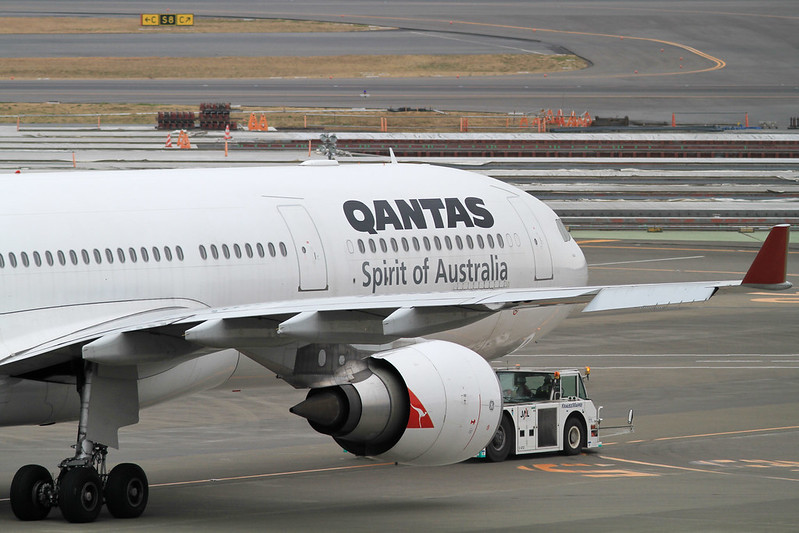
Qantas has historically been one of Australia’s most trusted brands. (File Photo: Kentaro IEMOTO/Flickr, CC BY-SA 2.0)
Last August, the Australian Competition and Consumer Commission (ACCC) launched legal proceedings against Qantas. The consumer watchdog accused the airline of selling thousands of tickets for domestic and international flights that had already been cancelled.
Today, both parties reached a settlement, avoiding a drawn out battle in court. The airline will pay A$20 million in compensation to 86,000 passengers who bought tickets on 8,000 flights that had already been cancelled. It will also pay a $100 million civil penalty.
It’s important to note this settlement is not yet finalised – it must first be approved by the Federal Court of Australia. The court will look at whether this amount is an appropriate penalty for the airline, and whether the compensation set to be paid is fair and reasonable.
In most cases, the court is willing to accept a settlement between a powerful regulator like the ACCC and a cooperating corporation. However, these final penalties are not guaranteed. In 2018, a $36 million settlement between Westpac and the Australian Securities and Investments Commission (ASIC) was thrown out because the court felt it was too low.
Qantas has historically been one of Australia’s most trusted brands. But in recent years, it has lost 7% of its brand value and fallen in global brand rankings. The decision to agree to this settlement goes to the heart of rebuilding trust and protecting consumers from further misleading conduct.
The airline admits to a lesser charge
The ACCC has a range of tools for tackling corporate misconduct. The ACCC Act – which underpins the regulator’s powers – aims to provide meaningful national consumer protection laws and coordinate the watchdog’s enforcement actions.
Some parts of this act cover what are known as civil breaches. These allow the regulator to impose major financial penalties, but not imprisonment. Other parts cover criminal breaches, and contain provisions to impose up to two-years imprisonment and fines of up to $50 million.
Selling tickets for flights that have already been cancelled is in clear breach of Section 18 of Australian Consumer Law for misleading and deceptive conduct. In 2019, this same section of the act was used to issue Volkswagen with a $125 million fine for misleading consumers on its vehicles’ emissions.
But this section is purely civil, which means a corporation or individual in question can only be forced to pay damages or compensation. The amount of compensation that can be ordered by the regulator is unlimited in dollar value, but restricted by the costs or damage incurred by the consumer.
This costs and damages approach is how Qantas’ $20 million compensation figure was calculated – $225 per ticket for domestic flights and $450 per international ticket. It’s important to note this compensation has to be paid on top of any new tickets or other compensation Qantas may have already supplied to affected customers.
But when it first filed the lawsuit, the ACCC accused Qantas of taking payments for goods or services it did not intend to provide. This is a far more serious criminal allegation that falls under Section 36 of Australian Consumer Law. Criminal cases are tried before a jury and require proof beyond reasonable doubt. Charges are much harder to prove than those in a civil case or even a civil penalty case, which is heard by a single judge and proven on the balance of probability.
The regulator agreed to drop this much harsher line of attack on the airline in exchange for the settlement. Still, ACCC Chair Gina Cass-Gottlieb didn’t mince words when announcing the settlement, labelling Qantas’ behaviour “egregious and unacceptable”.
In a media release, Cass-Gottlieb put the wider Australian business community on notice, saying she hoped today’s settlement would send:
an important message to companies across the economy that breaches of the Australian Consumer Law are serious and will result in material fines.
Why settle now and what happens next?
Qantas and the ACCC both understand that if this matter had been dragged into court proceedings, ticket holders may not have been compensated for a number of years. It could have also risked further reputational damage for Qantas. By agreeing to settle for the lesser charge – misleading conduct – the affected customers will be paid sooner.
The proposed remediation scheme will be handled independently by professional services firm Deloitte. But the Federal Court is unlikely to formally agree to the settlement before 1 July. Conveniently for Qantas, this will enable the airline to record the settlement as an expense in the current financial year but make the actual payments in the next one.
This settlement – if accepted by the Court – could help to rebuild Qantas’ reputation. But it will also serve as a powerful deterrent, signalling to the business community that misleading consumers will not be tolerated.![]()
Michael Adams, Professor of Corporate Law & Academic Director of UNE Sydney campus, University of New England
This article is republished from The Conversation under a Creative Commons license. Read the original article.





















